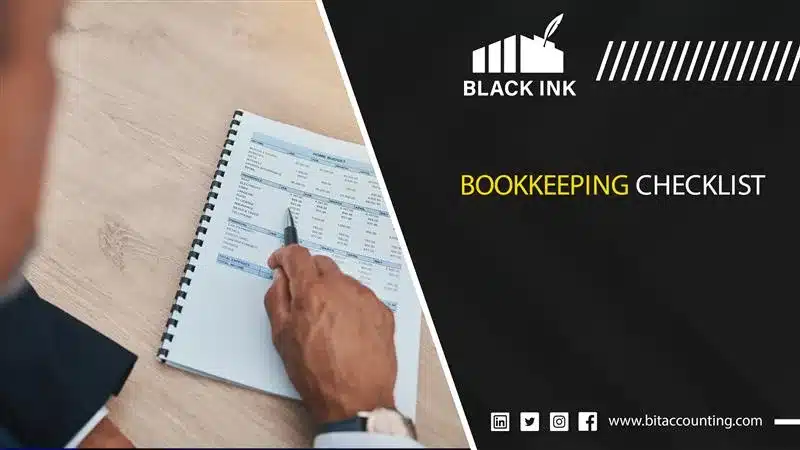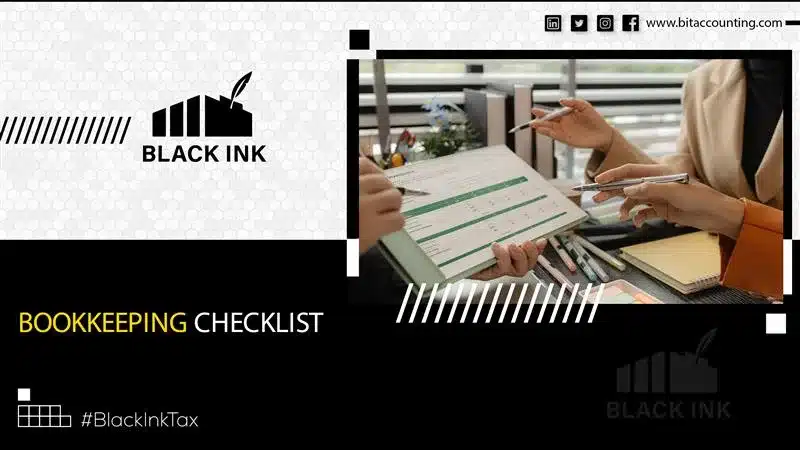
Table of Contents
The Ultimate Bookkeeping Checklist: Farewell to Messy Records
Keeping your business finances in order can feel like a big job—especially when you’re managing daily operations, customers, and your team. But one thing you can’t afford to ignore is bookkeeping. Without it, things get messy fast. That’s where a bookkeeping checklist becomes your best friend.
This guide will walk you through a complete checklist that helps you track money, manage records, and stay in control of your business’s financial health.
What is Bookkeeping?
Bookkeeping means keeping a clear record of all the money that comes in and goes out of your business. It includes tracking payments, expenses, invoices, and bank transactions. Bookkeeping also helps businesses stay ready for tax time, follow rules, and understand how the company is doing.
Whether you run a small shop or a growing company, accuracy and precision in your records matter. Mistakes can lead to missed payments, wrong tax returns, or even an audit.
Why Bookkeeping is Important for SMBs?
For small and medium-sized businesses (SMBs), bookkeeping does more than just track money. It:
- Supports smart decision-making
- Keeps your financial statements organized
- Helps meet regulatory compliance
- Prevents problems with the IRS
- Gives a clear view of your cash flow
- Makes strategic planning easier
Without good bookkeeping, a business can lose track of its income, spend more than it earns, or miss important deadlines—all of which can hurt your success and growth.
Types of Bookkeeping Checklists for Companies
A proper checklist keeps your workflow smooth and reduces the risk of missing steps. Here are different types of bookkeeping checklists businesses should follow:
- Daily Bookkeeping Checklist
- Weekly Bookkeeping Checklist
- Monthly Bookkeeping Checklist
- Quarterly Bookkeeping Checklist
- Annual Bookkeeping Checklist
Each type focuses on different accounting tasks to match your needs and timelines.
Everyday Bookkeeping Checklist
Tasks included in a daily bookkeeping checklist are:
Record Daily Transactions
Log every payment, sale, and purchase made through your point of sale (POS) system, merchant account, or cash register. Whether you’re using Stripe, Inc., PayPal, or any other payment system, record every financial transaction clearly.
Update Cash Flow
Monitor how much cash you have on hand. This helps track how money moves in and out of your business daily. Good cash flow records help avoid late fees, missed debt payments, or overdrafts.
Deposit Cheques and Cash
Make regular deposits into your bank account. Delays can lead to banking errors, missed payments, or confusion during reconciliation (accounting).
Weekly Bookkeeping Checklist
For weekly bookkeeping, you should:
Pay Bills
Schedule and process payments for vendors, services, or subscriptions. Use automation features in your bookkeeping software to avoid missed due dates.
Record All Receipts
Use a receipt app to save and organize your purchase records. This will be useful when filing tax returns and during an audit.
Review Accounts Payable
Check your accounts payable report to see which invoices are still unpaid. Make sure your business isn’t missing or delaying important payments.
Reconcile POS System
Match POS data with your actual bank and merchant account records. This ensures that sales, returns, and payments are being tracked correctly.
Check Merchant Accounts
Look over all merchant account activity, including services like Stripe, PayPal, or others. Confirm fees are accurate and there are no missing transactions.
Monthly Bookkeeping Checklist
Here are the tasks included in a monthly bookkeeping checklist:
Review Financial Statements
Check your income statement, balance sheet, and cash flow statement. These financial statements show how your business is doing and where you need to improve.
Prepare Accounts Payable
To stay ahead with vendor bills:
- Publish all receipts from your receipt app
- Review your accounts payable report and pay bills
- Match accounts payable with supplier balances
Review Accounts Receivable
Look at which customers still owe you money. Send reminders or follow up on invoices to avoid delayed revenue.
Categorize Uncategorized Expenses
Use your accounting software to sort any expense that hasn’t been labeled. This helps keep your budget accurate.
Reconcile Bank Accounts
Match your bank account records with your books to spot errors or missing transactions.

Reconcile Credit Card Transactions
Check your credit card statement and match it with your records. This includes checking for fraud or double charges.
Reconcile POS Systems, Merchant Accounts, and Others
Confirm that all your payment gateways and tools (like PayPal, Stripe, or your POS) match with your records.
Reconcile Other Balance Sheet Accounts
Reconcile other balance sheet accounts, including items like loans, assets, and equity. Accurate reconciliation prevents future trouble.
Balance the General Ledger
Check your general ledger for mistakes, wrong entries, or missing data.
Make and Compile Financial Reports
Create useful reports for your team or partners to show the financial health of the business.
Share Reports with Clients
If you’re a financial services provider, send reports to clients for review.
Password Protect and Close Books
Use information technology tools to lock your records and protect data. This improves privacy and transparency (behavior).
Quarterly Bookkeeping Checklist
Here is what you do quarterly:
Revise Annual Income Forecast
Update your income estimates based on what has happened so far in the year. This helps with budgeting and planning.
Quarterly Payroll Reports
File your payroll reports with the proper government offices, including Social Security tax (United States) and Medicare (United States).
Quarterly Sales Tax
Pay your sales tax or goods and services tax (Australia) and keep records for regulatory compliance.
Estimated Taxes
Submit estimated taxes to avoid a surprise bill at the end of the year.
Annual Bookkeeping Checklist
For the yearly bookkeeping checklist,
Review Year-End Financial Statements
Go over your financial statements to see the full picture of your business’s performance.
Make Sure Your Monthly Bookkeeping is Completed
Confirm that all monthly tasks are done and double-checked.
Clear Year-End Debt & Invoices
Pay off any remaining debt and send or collect invoices before closing the year.
Prepare & Review Financial Reports
Use this time to create clean reports that can help with strategic planning for the new year.
File Tax Returns
Prepare all the documents needed for your tax return and submit them on time to avoid penalties.
Backup Files
Use cloud storage, USB flash drives, or other data solutions to keep your files safe.
Manage Your Bookkeeping Checklist Effectively with an Expert Bookkeeper
Managing your checklist might feel like a full-time job—but you don’t have to do it alone. A professional bookkeeper or a financial accounting service like BIT Accounting can help you:
- Improve your workflow
- Avoid late fees or errors
- Use better software
- Stay ready for taxation
- Follow US laws and rules
- Maintain financial transparency
If you’re in the service industries or run a subscription business model, you’ll benefit from expert help. Using technology and automation, BIT Accounting keeps your records clean, your payments on time, and your business moving forward.
Conclusion
A complete bookkeeping checklist is key to a well-run business. Whether you’re tracking daily cash, reviewing your accounts receivable, or preparing for the IRS, staying organized helps you avoid stress and keep growing. Use this guide as your go-to resource for building strong, reliable financial systems that support your business goals.
FAQs
1: What is the difference between bookkeeping and accounting?
Bookkeeping involves recording transactions; accounting uses that data to create financial statements and reports for better decision-making.
2: Do I need special software for bookkeeping?
It’s highly recommended. Accounting software makes it easier to track expenses, create invoices, and prepare for taxes.
3: How often should I update my bookkeeping records?
Ideally, you should update them daily and review them weekly and monthly.
4: Why do I need to reconcile my bank accounts?
To make sure your records match your bank account activity and to avoid errors or missed transactions.
5: Can bookkeeping help me get a loan?
Yes! Clear financial records show banks or investors that your business is well-managed and trustworthy
GET FREE QUOTE FOR ALL OF OUR SERVICES
Black Ink will send you a free analysis of your current state and what would be the cost of managing either a separate accounting and bookkeeping services or a complete solution across New York, USA. Do get in touch and we will be happy to consult you with our bookkeeping services in NY, New York, USA.
